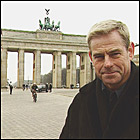
William Horsley, Association of European Journalists
16 March 2009
 Listen to the podcast Listen to the podcast
1. You have a lot of experience of the way that diversity and discrimination have been dealt with in the media. Can you tell me, why have you decided now to tackle this subject alongside the Council of Europe?
I personally have been reporting from around Europe and around the world and seen many ways in which the media's response to ethnic tensions and migration issues and so on can be decisive.
I think at the moment in Europe we're watching a very alarming situation unfolding with a rise in ethnic tension and intolerance and a failure of understanding. This is an offence. If the media are unable to encourage tolerance and to make the population aware of the need for understanding between races and so on, at a time when all the laws say that all should be equal, it's an offence really.
2. What role do you think the media has played in this situation?
The media have not performed well. That's my concern. It's particularly acute in South-Eastern Europe where minorities like the Roma now suffer real abuse and the media sometimes join in. But when you look at the situation in a country like France after the riots, you can see that the media there are still not comfortable with this issue. And the fact that ethnic minorities are not well represented, or their image in the media is not positive, is a sign that things are not well.
3. Who do you think has a responsibility for change. Is it governments? Is it the journalists ? Is it news editors?
I think the governments have an enormous responsibility. The Council of Europe's own assessment is that only five of the 47 member states have proper antidiscrimination laws with penalties that can be effective. Now that's not good enough. So I think part of this campaign involving the media is to raise the voice saying that governments have got to do better. After all, things like employment, access to jobs in the media, depend on that climate, on a climate of tolerance.
4. Have you seen some progress?
We do see some examples of best practice. We'll be promoting the idea of best practice and my own country - Britain - has done a lot in the last twenty years to make sure that there is a good representation of ethnic minorities and the whole tone of the debate is even-handed. And recently we heard from the head of the Equality and Human Rights Commission that Britain is the best place in Europe for non-whites to live. Well, I hope and believe that this is largely reflected in the media, but elsewhere there is an enormous amount of work to do.
5. The Council of Europe has 47 countries. That's 47 cultures and 47 different approaches. Do you really think that we could have a 'one-size-fits-all' solution to this problem?
Nobody is trying to impose a 'one-size-fits-all' pattern on the way that the goal is achieved. But the goal is common to all and that is to make the media responsive and reflecting a modern tolerant society and not to be part of the fanning of racism or antagonism between races or against any minority. And that is vital for the health of democracies around Europe.
6. As a reporter, you have a lot of concern for accuracy and reflecting the different points of view. Did you have a toolkit to do that?
As a BBC reporter, we have a lot of support and a lot of work has been done on the techniques and the skills of reporting: avoiding inaccuracies, avoiding stereotypes, searching out the underline issue, not taking things at face value.
For example when I was in Germany in the early '90s and there was an outbreak of a series of acts of violence and indeed deaths among Turkish minority people, the story told itself because this was a minority which didn't understand why it was hated, what had gone wrong.
The same was true with violence against asylum seekers who came in. In Germany , you had a society that was not used to the idea that tolerance or equality of opportunity among races is something that had to be built into the society. I watched the story unfold and I told the story of the awakening, gradual awakening of the majority of the population, that the scenes going on, the things being done in their name, were intolerable.
But at the beginning it was not well understood that it was intolerable. It was assumed that the majority population in some way had been invaded and now we see 12 years later the vocabulary has changed. German leaders no longer say: “ Germany is not an immigration country.” They say: “we need integration, we need understanding”.
But you still see, for example with the Turkish minority in Berlin , a dangerous trend towards apartheid, separate developments, polarisation and alienation of those communities.
7. You’re talking about a partnership where the media is one half and the communities also need to be more assertive and need to have more awareness within them about this problem?
They do, absolutely. I think the main obstacle is still the elitism or sort of the old thinking among managers, owners and indeed politicians. In many cases, governments are still not sensitised. They are still not ready to make the move. In many cases, media owners are not yet ready to make the move.
So, that's why we're focussing on a best practice, on good examples and on encouraging ethnic minority people to see the opportunities that exist and to be part of the wider community.
|